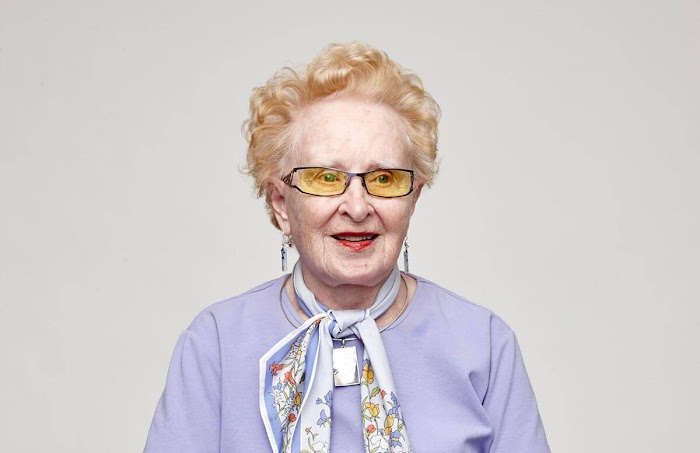Barbara Beskind, born in 1924, is a designer and inventor who, in 2013 aged 89, saw David Kelley - the founder of IDEO - on TV and decided to send him a letter because she had the impression that he "accepted, and really respected, people from a varied background" offering her "unique kind of life experience and designing skills".

"(...) I typed a letter, which might have caught their attention because they don't get many communications by "snail mail"- I have macular degeneration so my eyesight prevents me from using computers.
Within a week I got a response. They were just starting to design implements that would be helpful to the ageing, and so it was very fortuitous that I arrived at that time.
They invited me to come in and meet a few people. When we sat down at a table for four in the cafeteria, I thought, "That's very nice but I thought there were going to be a couple more people." What I couldn't see was that behind me people were filing in - about 30-35 designers and engineers. Suddenly, I found myself being introduced as the speaker. I got up and told my story and fielded some very interesting questions.
After that I became an adviser for equipment and designing products and services for the elderly and the low-vision community.
Every Thursday I walk three blocks to the train station - I know all the conductors now. I arrive at either the Palo Alto or San Francisco IDEO office around 10:00 and often sit on the same sofa, so that everyone knows where to find me. Word spreads from the front desk and people will arrange appointments with me for ongoing client projects. People will also stop by to talk about what is going on with various projects - it's an extremely collaborative environment.
I love working in this atmosphere. I may be six or seven decades older than some of the people I'm working with - and many of them have PhDs or masters degrees, which I don't - but I'm accepted as an equal. My voice is respected for what I bring to the table, for my experience, for my insights, and for my inventive, problem-solving nature.
For example, for one product - still under wraps - they intended to use batteries, but if these batteries are tiny, like the ones for hearing aids, older hands can't manipulate them easily and they drop them or lose them. My point was that it was better to recharge the product at night, when it is not being used.
No-one can expect, at a young age, to put themselves in the shoes of an elderly person and sense what it's like. Even as close as I am to the issues of the elderly, I have been amazed, and have learned from people whom I live with in my retirement community. I've always said to them, "Come and bring me your ideas of what you need."
There was a gentleman who came up to me recently and said: "Barbara, I need you to invent something for me - I walk slowly on a walker and I don't hear well, so when somebody comes up behind me and slaps me on the back it scares me to death. What can you do to help me? Maybe something that would be like a mirror?" I thought, "Well, that's a no-brainer." I went to the bicycle shop, got a rear-view mirror, attached it to his walker and he is so happy. (...)
If you're going to design for the elderly, ask them what they need, don't tell them. We don't need pink canes and jewelled pill boxes, we need functional equipment that makes us more independent, keeps us safe and gives us joy.
I think the elderly are an untapped resource, whose input should be sought. (...)"
“The team I worked with at IDEO — all who had master’s degrees and Ph.D.s — was very receptive to having a 90-year-old consult on their designs, and they accepted me as an equal. Their respect and eagerness to have me collaborate with them was tremendously important to me.”
- - - - - - - - -
photograph via






















Kewl!
ReplyDeleteAbsolutely!
DeleteCheers, Sam!